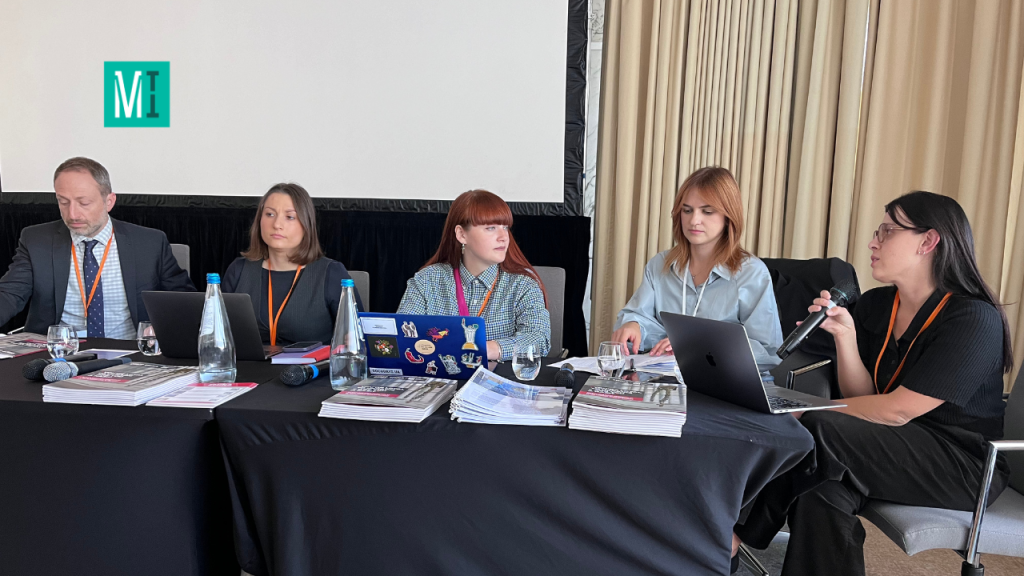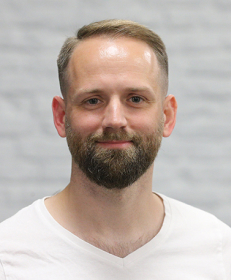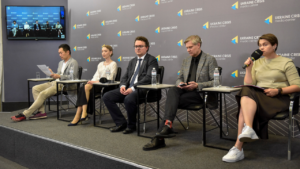“Torture and persecution of Ukrainians by Russia should be investigated as crimes against humanity” — human rights activists

In Warsaw, MIHR, Zmina, and OMCT presented a large-scale study of Russia’s crimes in the occupied territories of Ukraine. It is about the torture and persecution of Ukrainians on political and ideological grounds. During the discussion, they also talked about the medical and legal documentation of torture, with PHR sharing its experience.
The report is based on 63 in-depth interviews with civilians who have suffered or witnessed torture and other forms of ill-treatment committed by the Russian military. These interviews were recorded by MIHR and ZMINA, in particular, during 24 field missions to the liberated territories of Kyiv, Chernihiv, Zaporizhzhia, Donetsk, Kharkiv, and Kherson regions.
— Russian troops and intelligence services have deployed an unprecedented system to identify and segregate anyone suspected of opposing the Russian invasion, whether they did so openly or covertly, — said Yelyzaveta Sokurenko, head of war crimes documentation at the Human Rights Center Zmina. — The victims were subjected to enforced disappearances, arbitrary detention, extrajudicial killings, torture, sexual violence, deportations, and other gross violations of International Human Rights Law and International Humanitarian Law.

The event was held as part of the OSCE Warsaw Human Dimension Conference. Photo by MIHR
The authors of the report note that in the documented cases, the victims were subjected to the most severe torture during interrogation. They also suffered or witnessed constant physical and psychological violence by Russian military personnel. According to the report, there was a clear division of roles among the perpetrators, and interrogations in different regions and places of detention followed identical scenarios and used similar methods.
— Testimonies of victims and witnesses indicate that units of the Russian Ministry of Internal Affairs, the Russian Ministry of Defense, military units of the so-called DPR and LPR, the National Guard, and the Federal Security Service of the Russian Federation are involved in torture and related crimes against residents, — Sokurenko said.
The report also states that all documented cases of torture were aimed at intimidating civilians and discriminating against them on political grounds. It also turned out that during interrogations, the perpetrators stated that their motive for torture was to punish civilians for real or perceived cooperation with the Ukrainian army or for their civic position in support of Ukraine. All this, according to the authors of the report, confirms that the primary goal of the Russian military was to force Ukrainians to submit.
The World Organization Against Torture (OMCT) has developed three roadmaps to investigate torture and persecution as crimes against humanity. Among the critical elements of these crimes to focus on, OMCT identifies the investigation of filtration measures, the analysis of the chain of command in places of detention, the possible involvement or tolerance of officials at the highest state level in these crimes, and the analysis of patterns of crimes by time period and geography.
— The same filtering measures are applied to all occupied territories. The only difference is the northern regions of Ukraine, which were quickly de-occupied, so Russian forces simply did not have time to deploy such a well-organized filtering system there, including tapping cell phones, monitoring residents’ social media activity, accessing local government databases, etc. Instead, in the southern and eastern regions, which have been under occupation for a long time, the filtering measures are almost identical, — says Maria Kvitsinska, Human Rights Advisor for OMCT’s Europe and Central Asia programs.
She also emphasizes the same goal of checking the population in different occupied regions of Ukraine, indicating the crime’s systematic nature. For example, the Russian military is looking for markers of people’s disloyalty to Russia and their pro-Ukrainian position: likes and subscriptions to pro-Ukrainian telegram channels and groups on social media, photos with Ukrainian or Western European symbols, relatives or friends in the Armed Forces, Ukrainian patriotic tattoos, etc. Moreover, the methods of torture are the same everywhere.
— The incredible similarity in the patterns of torture, ill-treatment, and related crimes committed at different times and in different places by various units of the Ministry of Internal Affairs, the Federal Penitentiary Service, the Ministry of Defense, the FSB and others indicates that these crimes are well coordinated at least at the level of the leadership of these structures, — concludes the representative of the OMCT.

The speakers. Photo by MIHR
The World Organization Against Torture emphasizes that under International Criminal Law, the investigation of the crime of persecution requires proving the political component of this crime, reconstructing the chain of command, and confirming the discriminatory intent to attack a particular group for political and ideological reasons.
Bringing perpetrators to justice for torture is impossible without careful and, most importantly, correct documentation of crimes.
This requires reliable evidence. In cases of war-related torture, such evidence is often medical documentation. The problem is that in Ukraine, only forensic medical experts can issue such conclusions in Ukraine, and there is a catastrophic shortage of them.
— In Ukraine, there is a limited number of certified forensic medical experts, which is why documentation is delayed even in cases of sexual violence, where timeliness and accuracy of examination are crucial, — emphasizes Ulyana Poltavets, a representative of the organization “Physicians for Human Rights.” — In addition, there is no single medical and legal form in Ukraine that would ensure the proper quality of documentation of torture and conflict-related sexual violence. Doctors do not have a clear protocol for documenting such cases.
According to Poltavets, family doctors’ or gynecologists’ medical examinations of the victims could help resolve this issue. Moreover, their conclusions can be attached to a criminal case or a forensic expert’s report. However, the quality of such documentation is often poor, and their significance in court is much less weighty than expert opinions.
— Doctors and medical staff who are in direct contact with victims lack proper training. Many of them do not know how to effectively document cases of violence, which leads to inaccuracies in the information collected and re-traumatization of victims. In addition, many medical workers do not know how to appropriately interact with law enforcement agencies to ensure a complete and proper investigation, — Poltavets says.

After the event, all participants received copies of the report from the MIHR, OMST, and Zmina. Photo by MIHR
According to her, Ukraine should expand the range of professionals involved in documenting torture and other types of violence. After appropriate training, these can be general practitioners and even forensic nurses. Under such conditions, the time to record cases of torture and sexual violence will be reduced significantly, which is critical for these types of crimes. Read recommendations on medical and legal documentation to improve victims’ access to justice here.
This publication (replace according to the document) has been produced with the support of the European Endowment for Democracy (EED). Its contents do not necessarily reflect the official opinion of EED. Responsibility for the information and views expressed in this publication lies entirely with the author(s).







